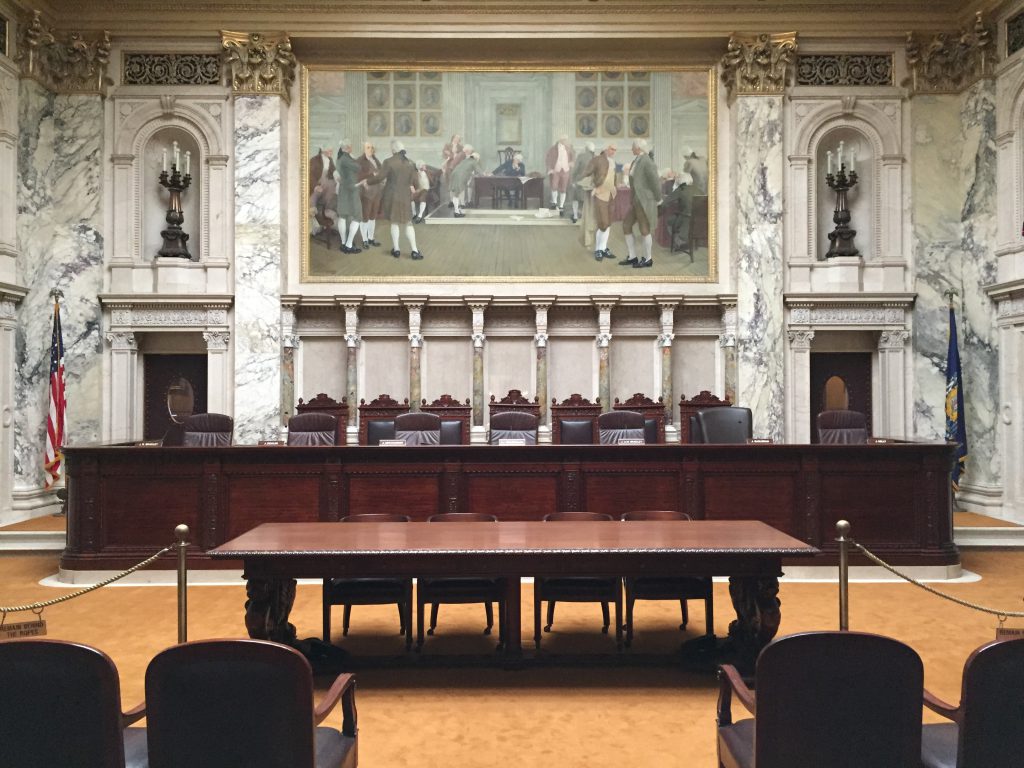High Court Upholds Gun Possession Ban for Felons
But state research used to push for this criticized in Supreme Court decision.
Did the state misrepresent data it used to argue that convicted felons should never be allowed to own guns?
State Supreme Court Justice Brian Hagedorn said yes, and an analysis of the data suggests the state’s presentation was misleading, at best.
Assistant State Attorney General Sarah Burgundy and Attorney General Josh Kaul contended in a brief that a Department of Corrections study showed that “Public-order offenders had a significant rate of recidivating with violent crimes. For example, based on data from prisoners released in 2011 for public order offenses, 21.4% recidivated with a violent offense…”
But this reporter’s analysis of the data contained in the report found that only 6% of public-order offenders recidivated with violent crimes.
When asked for comment for this via email, Burgundy simply referred me to the DOC study.
Public-order offenses, the study said, included non-property, non-violent crimes such as fifth- or sixth-offense drunk driving, felony failure to pay child support, possession of a firearm by a felon, and felony bail jumping.
The appellant in the gun case, Leevan Roundtree, was convicted in 2003 of felony failure to pay child support and was placed on probation, which he completed. But in 2015, police found a gun under his mattress, and he was convicted of felon in possession of a gun and sentenced to 18 months in prison and 18 months of extended supervision.
DOC defined recidivism in its report as “Following an episode of incarceration with the Wisconsin DOC, to commit a criminal offense that results in a new conviction and sentence to Wisconsin DOC custody or supervision.”
Burgundy and Kaul, in their brief, also said the study’s data showed that “the 21.4% of public-order offenders recidivating with a violent crime was higher than that of property offenders (16%) and drug offenders (17.9%),” they wrote. “And it was just seven percentage points lower than the rate of violent offenders (28.3%).
This reporter’s analysis found that 6.6% of property offenders, 5.5% of drug offenders, and 7.7% of violent offenders recidivated with violent crimes.
The DOC study did not measure the released offenders who recidivated with violent crimes, as the brief suggested. It measured instead the share of recidivists who committed such crimes, as Hagedorn said in his dissent.
The state’s brief did not make clear that the percentages it cited so prominently represented a percentage of percentages.
Justice Ann Walsh Bradley cited the state’s figures in the majority opinion upholding the gun possession ban.
“This data is surely sufficient to support a substantial relation between keeping firearms out of the hands of those convicted of nonviolent felonies and the public safety objective of preventing gun violence,” Walsh Bradley wrote.
“That’s simply not what the study says, and it is an egregious error in light of its almost singular prominence in the State’s effort to prove the requisite connection,” Hagedorn wrote in a dissent
“It should be obvious, then, that this (21.4%) statistic offers no assistance in establishing the relationship between past crime and a person’s risk to commit gun-related violent crime in the future, which is the core inquiry of the intermediate scrutiny analysis,” he noted.
Gretchen Schuldt writes a blog for Wisconsin Justice Initiative, whose mission is “To improve the quality of justice in Wisconsin by educating the public about legal issues and encouraging civic engagement in and debate about the judicial system and its operation.”
Court Watch
-
No Unemployment Benefits For Worker Making Homophobic Remarks
 May 17th, 2022 by Gretchen Schuldt
May 17th, 2022 by Gretchen Schuldt
-
Appeals Court Upholds Injunction Against Abortion Protester
 Mar 13th, 2022 by Gretchen Schuldt
Mar 13th, 2022 by Gretchen Schuldt
-
80% of State’s Judicial Races Uncontested
 Feb 20th, 2022 by Gretchen Schuldt
Feb 20th, 2022 by Gretchen Schuldt





















